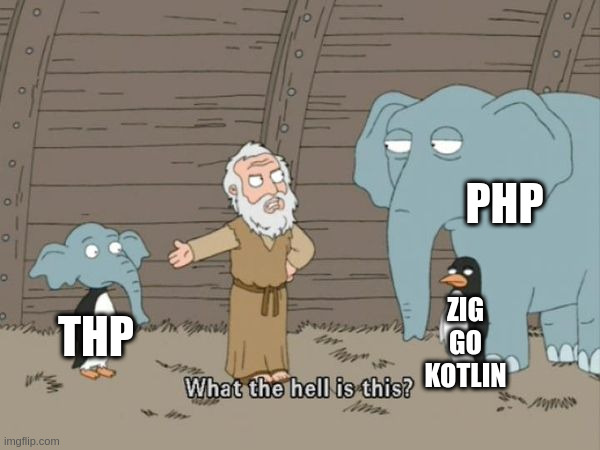Welcome
Welcome to the documentation of the THP programming languague.
THP is will be a new programming language that compiles to PHP.

Compiler rewrite
THP was previously written on Rust, but now it’s being rewritten in Zig.

Due to the rewrite everything has reversed. The Rust version was v0.1.3,
the Zig rewrite is v0.0.1. Also, this is a good opportunity to version
the docs.
The latest branch contains future ideas and stuff, but the versioned branches
(for example, v0.0.1) will document only actual, implemented
things, and new branches will be published as the compiler evolves.
Why?
PHP is an old language. It has been growing since 1995, adopting a lot of features from many places like C, Perl, Java, etc. This was done in a very inconsistent way, as detailed by Eevee in their article PHP: a fractal of bad design.
Along the years PHP has been improving. PHP added classes, exceptions, interfaces, traits, type hints and checks, functional features, reflection, etc., etc. However, by building on top of the existing language without a clear design philosophy, and by keeping backwards compatibility, we ended up with a messy language. The article above goes into detail about this.
In spite of this, PHP has remained widely used and loved, in a weird way (I’d say in the same way that people love JavaScript), and at the time of writing PHP 8.3 is available. However, PHP is to my eyes fundamentally flawed, and cannot be fixed without completely breaking what came before.
This is where THP comes in. I wanted a modern language that could run in the same environment that PHP does. And I quickly realized that building on top of PHP in the same way that TypeScript did for JavaScript would be detrimental. It would be better to create a completely new language, treat PHP source code as a “low level” compilation target, and focus entirely on the new language.
This new language would be mainly inspired by what I consider the best designed languages out there: Rust as a baseline, Zig for its null and error handling and Kotlin for its OOP features. In a way, PHP will be adapted to, say, Rust’s syntax and semantics, instead of having Rust adapt to PHP.
In pursue of this THP will ditch many things about PHP,
in name of consistency. These are things that PHP devs are
used to doing, but that I consider bad practices, hacks or
workarounds. One example of this are variable variables on PHP:
$$variable.
Another critical point of THP is type safety. It is a goal
to approach the same level of type safety that have compiled
languages like Java/Go/Rust, and leave aside dynamic typing
as much as possible. Types cannot be turned off, you cannot
use Any to avoid typechecking, and so on.
Finally, there are some additions to the language that I consider essential today: A good, unified LSP, type definitions, accesible documentation, an opinionated code formatter and plugins for major editors like VSCode and Neovim.
Goals
- Implement a strongly typed language, without unknown types
- Implement generics
- Reduce implicit type conversion to a minimum.
- Remove the inconsistencies in the language.
- Organize the PHP stdlib.
- Have a clear distinctions between Arrays, Tuples, Maps and Sets.
- Implement Sum types
- Have typings for popular libraries (like TS’s
.d.ts). - Have a simple instalation, with a single binary
- Ship a blazingly fast, native binary, written in Zig.
- Ship a language server, linter & formatter built in.
- Configure a THP project with a single file.
- Support in-place compilation of individual files.
Not goals
These are not things that THP wants to solve or implement
- Be what TypeScript is for JavaScript (PHP with types).
- Strictly adhere to PHP syntax/conventions.
- Strictly reuse PHP syntax
THP intentionally uses a different syntax from PHP to signal that it is a different language, and has different semantics.